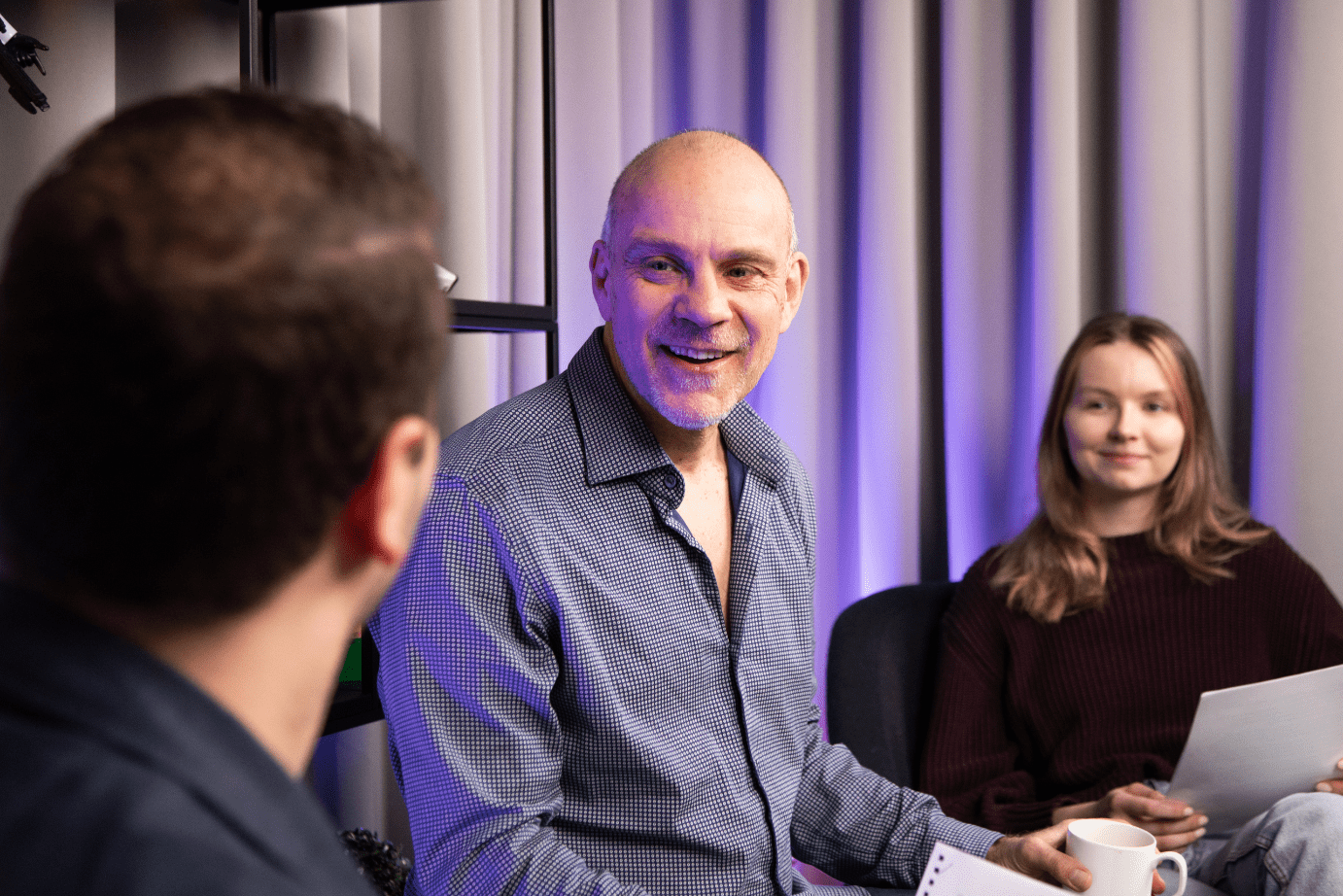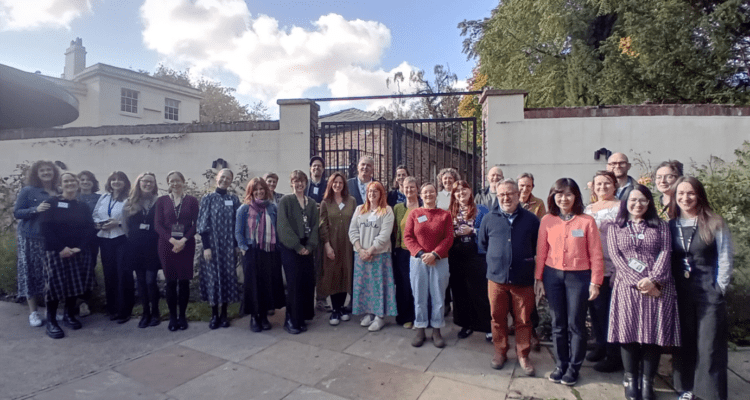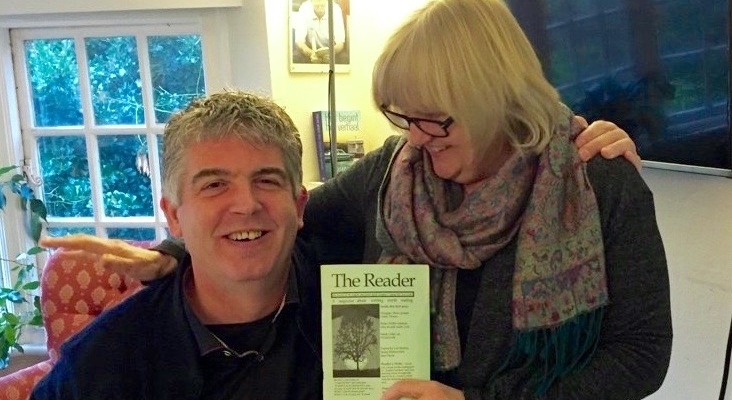Henrik Wig, Sweden: ‘In a world where democracy is in many ways threatened, Shared Reading can be a counterforce’
Literature teacher Henrik has been running Shared Reading groups across southern Sweden for six years with children’s groups and at one of Sweden’s largest prisons. He is currently one of four Reader Leaders working on a two-year state-funded project on the Psychiatric ward at the University Hospital of Sahlgrenska, Gothenburg.

How I first heard about Shared Reading
As a teacher of literature, I’ve always been interested in reading together with others. I’ve been involved in different reading projects over the years, not only in the education system.
For many years, I led more traditional book clubs at a library. But I found it hard to reach others who were not already long-time readers. Six years ago I read a short article about Shared Reading. It said that this method was tailor-made to reach everyone, not just the well-educated or those with higher education. Those words are what started it all. I thought: ‘This might be what I need’.
Three weeks later I managed, thanks to a cancellation, to get a place on The Reader’s Read to Lead training course (high-quality training to equip an individual with the essential skills and knowledge necessary to deliver a Shared Reading group).
My experience of Read to Lead and the Train the Trainer programme
The Read to Lead course and Train the Trainer (a programme teaching experienced Reader Leaders how deliver Read to Lead courses) made clear ideas that I’d had about reading for some time.
The three main things I gained
First and foremost, literature can be a source of personal growth, insight and learning.
To do that, reading must involve the personal connection, thinking and talking about what a poem or a piece of prose means to you. And to get to that depth, feelings are essential. When you connect emotionally to a poem or a story that´s when literature can start to heal, to comfort and to strengthen. But that doesn´t come about all by itself.
I understood, secondly, how central the Reader Leader is to let that happen. Their kindness, willingness to listen and trust in the group members' ability is crucial for these connections to be made. A safe and secure space paves the way.
Thirdly, I realised how liberating it was to just let go of all ambitions to teach others, just to gently help them to explore their own reactions. For me, being a Reader Leader is all about helping others to connect to literature, not to demonstrate your own ability.
“If I would summarise their views in one word it would be ‘present’ – they feel alive when we read and explore together”
What I think is particularly special about the experience of Shared Reading
In my evaluation people very much enjoy the no-pressure, non-judgmental atmosphere. They enjoy listening to others, their perspectives, and opinions, and they enjoy talking about literature in a personal, associative way. But if I would summarise their views in one word it would be ‘present’ – they feel alive when we read and explore together.
I think Shared Reading can play an important role in many spheres of my community
It can break the dangerous feeling of isolation that threatens our societies. That’s not a hope only for certain groups, but for everyone. There’s a need to talk about important life questions. And I see that in the health care system, there’s a growing interest in what social reading, like Shared Reading, can do.
In the educational system I experienced that although Shared Reading could help students become lifelong readers, the space for Shared Reading can be rather limited due to the grading system and the way that the curriculum is focusing mainly on technical aspects of reading. Still, there are teachers in my community that I have trained and who are using Shared Reading in their teaching.
In a world where democracy is in many ways threatened, Shared Reading can be a counterforce - letting people meet, explore together, listen to each other and put thoughts and feelings into words.
A moment or experience that has really stood out me
Let me speak a little bit about one of the groups I ran with seven-year-old children.
At an initial meeting before my group the two class teachers told me that one of the boys – I call him William – sometimes suffered from severe anger attacks. On one session we read a poem about anger, called Tired. It ended like this: ‘But afterwards/ I collapse inside into a hopeless/ pile of dough’.
When William´s group had ended, a second group with the other half of the class started. But in the middle of the session, I heard him having an attack, screaming, and pounding on the wall. It ended soon, but considering the intensity it must have been quite draining.
Afterwards, when I was leaving, I met William in the corridor, who was silent. After a while, I said: ‘I heard you were angry. How do you feel now?’ William replied: ‘Pile of dough’.
In short, the poem had given him a way to speak about his feelings. And he knew that I understood since we had read the poem together. He’d really taken the poem to heart. On my way home I thought that this was an example of Shared Reading at its best, giving participants a language for what’s going on inside.
How Shared Reading has positively impacted my life
The first might seem a little trivial. It’s simply the power of kindness. Being kind is the essential foundation if you want people to overcome their anxiety about being personal and expressing thoughts on a literary text.
Furthermore, I’ve become kinder. It shows that kindness is something we can learn and not something that’s decided, as we often tend to think. When I practice kindness – active listening, encouraging my curiosity, being empathetic, having patience – slowly I get better. I very much appreciate this, as well as the people around me.
Having Shared Reading at the Psychiatric ward at Sahlgrenska has a huge impact on me. Just seeing what a literary text can do. People relate to it, it comforts them, gives sudden moments of intense insight and awakes memories. Afterwards I feel energetic, thankful for what I have just witnessed.
I don´t want to give the impression that it’s always like that, but I do have a feeling that something very precious is happening at every session. And I’m always moved by the way that participants support each other when strong feelings arise.
“There’s a need to talk about important life questions”
What I would say to someone else who’s interested in exploring how Shared Reading can be brought to their country or community...
Listen to the experiences of others who have travelled the same path. Try not to work alone. Team up with others who are interested in what literature can do. If you´re a Reader Leader, get in contact with other Reader Leaders, to share experiences, texts, and ideas. Stay in contact with the mothership in Liverpool to get support.
Don´t regard Shared Reading as something magical. It takes time and experience to develop the skills of a good Reader Leader. Accept that it’s an ongoing process. It takes time to find the right participants but when you do, possibilities can suddenly open in an unexpected way.
Thanks to Reader Leaders like Henrik, Shared Reading can now be found in countries including Sweden, Norway, Switzerland, Denmark, Germany, Belgium, the Netherlands, New Zealand and the United States.
Start your Reader Leader journey here. To find out more about our International Shared Reading opportunities, visit our dedicated webpage here.
Want to find out more? Join us in person at the Home of International Shared Reading in Calderstones Park, Liverpool this October. Whether you’re completely new to Shared Reading or an experienced Reader Leader already, our doors are open, and the welcome is warm! Find out more here.
Share
Related Articles

Celebrating the first ever International Shared Reading Conference
‘It has been a wonderful day - great meeting you all! Loved the Shared reading and getting new knowledge. Inspiring…

Reader Revisited: An Interview with Het Lezerscollectief (The Readers’ Collective)
We're taking a trip down memory lane and revisiting articles from The Reader Magazine. This article first appeared in issue 73.…

Kerstin, North Germany: ‘In all these groups I’ve the privilege to continuously learn’
An experienced Reader Leader, Kerstin now runs several Shared Reading Bremen groups since training in Berlin with The Reader in…


